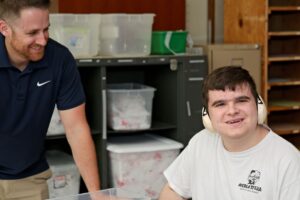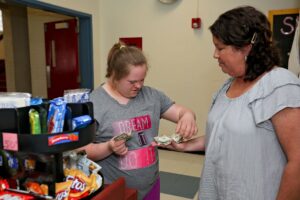In this month’s blog, Pyramid USA Senior Consultant, Tony Castrogiovanni, PhD shares some insights for improving communication skills for learners beyond the classroom setting. You’ll find some helpful communication strategies for adults with autism and related communication challenges. Read on to learn how teaching critical communication skills can improve functional life skills and independence for our adult learners.
Preparing our Learners
Our students and children inevitably grow and change and often, in what seems a flash, we’re beginning to think about graduating and leaving school. Whenever we go through a large
When we think of our students, our children at any age, we tend to be consumed by the moment – so much to get done: places to go, people to see, lessons to be taught, the needs of everyday life and on and on… our attention is focused on what to do ‘right now’. At Pyramid, we focus on the educational environment with an emphasis on communication, whether that is with PECS® or through the best modality/system for the individual learner.
Communication Planning
Planning for communication in educational settings represents many activities as we think about our learner’s needs: assessment of current skills and repertoires, the acquisition of social
At Pyramid, we prefer the training sequence presented in the PECS protocol, regardless of the system/modality in place, while always being mindful of an individual’s unique characteristics. That sequence begins with initiating requesting and learning social approach. Vocabulary differentiation and extended communication, including attributes and modifiers, follows. Introducing ‘WH’ questions in the form of a responsive request (“What do you want?”) and then more “WH” words as responsive commenting is introduced. Our learner would then move on to learning to initiate comments as appropriate.
This training sequence allows for a broad repertoire of skills to be developed and a strong foundation upon which to expand. Included in the skills are what we refer to as “Critical Communication Skills”. They are:
- Requesting what you want
- Requesting help

- Requesting a break
- Rejecting (Responding No)
- Affirming (Responding Yes)
- Responding to wait or no
- Transitioning
- Following directions
- Following a schedule
The sequencing of teaching may vary for an individual, but we have a communication training timeline that we use as a guide (PECS Training Manual 2nd ed. P 365). Teaching plans may be found in Chapter 11 of the PECS Training Manual or by attending an on-line or in-person PECS Level 1 Training.
Expanding and Generalizing Critical Communication Skills
The Critical Skills listed above (as well as the foundational skills) need to grow and change just as our learners grow and change. Out of the issues of where to live, what to do and so on comes an emerging concept of ‘quality of life’. Our wishes for all our learners are for a high quality of life to be had by all. There are many avenues here and communicative growth is a big one! Our expectations change for all children as they grow into adulthood. We don’t expect a 4-year-old to handle disappointment as well as a 9 year old or a 14 year old or an 18 year old. Receptive ‘no’ and receptive ‘wait’ are skills that can be limiting in adult life if you have difficulty. Similarly, being able to transition or ask for a break will be limiting in adult life if there are issues in this area. Think about the ‘schedule’ we have our learners follow – how will this look during the day, not at home or school post 21? What level of support is needed at 10 years old communicatively and how might this look and operate 10 years from now?

Our hope for all our learners is that their communicative skills grow and change to meet current circumstances. The natural progression of all communication as we grow must be attended to. We ask for more as time goes by. We note that an overarching goal of school is preparation for the rest of your life as well as being able to enjoy a good quality of life as they leave school!
Additional Support
To learn more about Teaching Critical Communication Skills attend a live remote, in-person, or recorded online training!
For ongoing support with communication skills, AAC implementation, the PECS protocol, and the Pyramid Approach, join our online community on Facebook. Search “PECS User Support” on Facebook and request to join. This active group of over 27,000 professionals, parents, and caregivers is monitored by our Pyramid Consultants from around the globe daily!
Written By Tony Castrogiovanni, PhD
© Pyramid Educational Consultants, LLC. 2022
